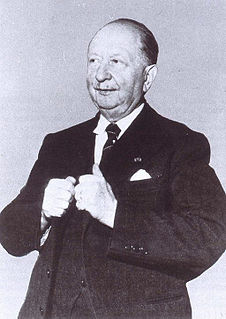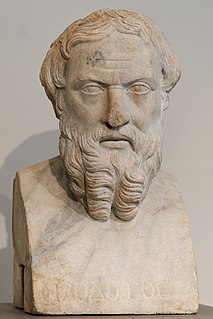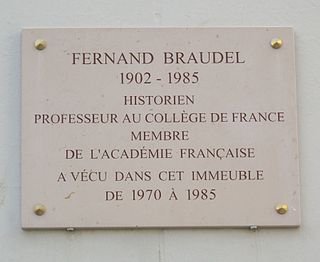
The Annales school is a group of historians associated with a style of historiography developed by French historians in the 20th century to stress long-term social history. It is named after its scholarly journal Annales d'histoire économique et sociale, which remains the main source of scholarship, along with many books and monographs. The school has been highly influential in setting the agenda for historiography in France and numerous other countries, especially regarding the use of social scientific methods by historians, emphasizing social and economic rather than political or diplomatic themes.

Historiography is the study of the methods of historians in developing history as an academic discipline, and by extension is any body of historical work on a particular subject. The historiography of a specific topic covers how historians have studied that topic using particular sources, techniques, and theoretical approaches. Scholars discuss historiography by topic—such as the historiography of the United Kingdom, that of WWII, the British Empire, early Islam, and China—and different approaches and genres, such as political history and social history. Beginning in the nineteenth century, with the development of academic history, there developed a body of historiographic literature. The extent to which historians are influenced by their own groups and loyalties—such as to their nation state—remains a debated question.

A historian is a person who studies and writes about the past and is regarded as an authority on it. Historians are concerned with the continuous, methodical narrative and research of past events as relating to the human race; as well as the study of all history in time. If the individual is concerned with events preceding written history, the individual is a historian of prehistory. Some historians are recognized by publications or training and experience. "Historian" became a professional occupation in the late nineteenth century as research universities were emerging in Germany and elsewhere.

Fernand Braudel was a French historian and leader of the Annales School. His scholarship focused on three main projects: The Mediterranean, Civilization and Capitalism (1955–79), and the unfinished Identity of France (1970–85). He was a member of the Annales School of French historiography and social history in the 1950s and 1960s. He was a student of Henri Hauser.

The historiography of the French Revolution stretches back over two hundred years, as commentators and historians have used a vast array of primary sources to explain the origins of the Revolution, and its meaning and its impact. By the year 2000, many historians were saying that the field of the French Revolution was in intellectual disarray. The old model or paradigm focusing on class conflict has been largely abandoned but no new explanatory model had gained widespread support. Nevertheless, there persists a very widespread agreement that the French Revolution was the watershed between the premodern and modern eras of Western history.
Cultural history combines the approaches of anthropology and history to examine popular cultural traditions and cultural interpretations of historical experience. It examines the records and narrative descriptions of past matter, encompassing the continuum of events about a culture.

Lucien Paul Victor Febvre was a French historian best known for the role he played in establishing the Annales School of history. He was the initial editor of the Encyclopédie française together with Anatole de Monzie.
François Furet was a French historian and president of the Saint-Simon Foundation, best known for his books on the French Revolution. From 1985 to 1997, Furet was a professor of French history at the University of Chicago.

The School for Advanced Studies in the Social Sciences is a graduate grande école and grand établissement in Paris focused on academic research in the social sciences. The school awards MRes and PhD degrees alone and conjointly with the grandes écoles École Normale Supérieure, École Polytechnique, and École pratique des hautes études.

Jean-Claude Schmitt is a prominent French medievalist, the former student of Jacques Le Goff, associated with the work of the Annales School. He studies the socio-cultural aspects of medieval history in Western Europe and has made important contributions in his use of anthropological and art historical methods to interpret history. His most significant work has dealt with the relationships among elites and laymen in medieval life, particularly in the realm of religious culture, where he has focused on ideas and topics such as superstition, the occult and heresy in order to flesh out the differing world-views of the lay peasantry and the clerical elites who attempted to define religious practice. He has contributed numerous books, articles and encyclopedia entries on these and related topics. He has also written widely on the cult of saints, the idea of adolescence, visions and dreams, and preaching.
A history journal is an academic serial publication designed to present new scholarship on a historical subject, usually a subfield of history, with articles generally being subjected to peer review.
The history of mentalities or histoire des mentalités is the body of historical works aimed at describing and analyzing the ways in which people of a given time period thought about, interacted with, and classified the world around them, as opposed to the history of particular events, or economic trends. The history of mentalities has been used as a historical tool by several historians and scholars from various schools of history. Notably, the historians of the Annales School helped to develop the history of mentalities and construct a methodology from which to operate. In establishing this methodology, they sought to limit their analysis to a particular place and a particular time. This approach lends itself to the intensive study that characterizes microhistory, another field which adopted the history of mentalities as a tool of historical analysis.

Count Georges Vacher de Lapouge was a French anthropologist and a theoretician of eugenics and racialism. He is known as the founder of anthroposociology, the anthropological and sociological study of race as a means of establishing the superiority of certain peoples.
Claude Meillassoux was a French neo-Marxist economic anthropologist and Africanist. A student of Georges Balandier, he did fieldwork among the Guro (Gouro) of Côte d'Ivoire; his thesis was published in 1964. In the 1970s he criticised Marshall Sahlins's use of the notion of "domestic mode of production". Meillassoux was throughout his life a politically committed critic of social injustice.
Paul Marie Isidore Harsin (1902–1983) was an economic and political historian who held doctorates in the humanities, social sciences, and law. He was a professor at the University of Liège for over 40 years and briefly served as president of the Royal Academy of Science, Letters and Fine Arts of Belgium.

The journal Revue de Synthèse was created by Henri Berr in 1900 under the title Revue de synthèse historique. It has had a variety of editorial partners since its creation. It is currently published in paper and electronic version by the Springer Verlag publishing company in Paris.
The term new history, from the French term nouvelle histoire, was coined by Jacques Le Goff and Pierre Nora, leaders of the third generation of the Annales school, in the 1970s. The movement can be associated with cultural history, history of representations, and histoire des mentalités. The new history movement's inclusive definition of the proper matter of historical study has also given it the label total history. The movement was contrasted with the traditional ways of writing history which focused on politics and "great men". The new history rejected any insistence on composing historical narrative; an over-emphasis on administrative documents as basic source materials; concern with individuals' motivations and intentions as explanatory factors for historical events; and the old belief in objectivity.
Peter Schöttler is a German historian working in France and Germany. He was a research director at the Centre national de la recherche scientifique in Paris and teaches now at the Freie Universität Berlin, where he has held an honorary professorship since 2001.
Gregory Stephen Brown is an American historian specializing in French history and cultural History. His research regards "Enlightenment France and issues of 'self-fashioning,' performance and printing, patronage, and censorship." He is the General Editor and Senior Research Fellow at the Voltaire Foundation, University of Oxford, for the Oxford University Studies in the Enlightenment.

Jean-Claude Perrot was a French historian. He specialized in urban history, economic politics, demography, and statistics. His studies focused around 18th-Century France and he was a professor at the Sorbonne University Association and the School for Advanced Studies in the Social Sciences. He was also President of the French Institute for Demographic Studies.









